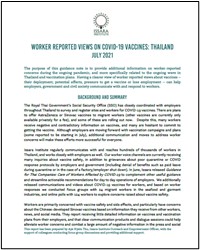The Royal Thai Government’s Social Security Office (SSO) has closely coordinated with employers throughout Thailand to survey and register sites and workers for COVID-19 vaccines. There are plans to offer AstraZeneca or Sinovac vaccines to migrant workers (other vaccines are currently only available privately for a fee), and some of these are rolling out now. Despite this, many workers receive negative and contradictory information on vaccines, and many are hesitant to commit to getting the vaccine. Although employers are moving forward with vaccination campaigns and plans (some reported to be starting in July), additional communication and moves to address worker concerns will make these efforts more successful for everyone.
Issara Institute regularly communicates with and reaches hundreds of thousands of workers in Thailand, and works closely with employers as well. Our worker voice channels are currently receiving many inquiries about vaccine safety, in addition to grievances about poor quarantine or COVID response protocols by employers and government (including denial of benefits such as paid leave during quarantine or in the case of a factory/employer shut down). In June, Issara released Guidance for Thai Companies: Care of Workers Affected by COVID-19 to complement other useful guidance and streamline actionable recommendations for day to day operations of employers. We additionally released communications and videos about COVID-19 vaccines for workers, and based on worker responses we conducted focus groups with 24 migrant workers in the seafood and garment industries, and online polls with 124 workers to explore concerns raised about vaccine safety.
Workers are primarily concerned with vaccine safety and side effects, and particularly have concerns about the Chinese-developed Sinovac vaccines based on information they receive from other workers, news, and social media. They report receiving little detailed information on vaccines and vaccination plans from their employers, and that clear communication products and dialogue sessions could help alleviate worker concerns and combat a large amount of negative information in the press and social media on vaccine safety and side effects. During the discussions, it was clear that workers able to discuss their concerns and hear clear information regarding vaccines are more likely to feel comfortable being vaccinated, but many still hold concerns about side effects and ways their employer is communicating about and responding to the current outbreak in Thailand and vaccine plans.

